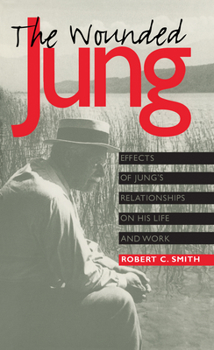The Wounded Jung: Effects of Jung's Relationships on His Life and Work
Select Format
Select Condition 
Book Overview
Carl Jung, the founder of analytical psychology, is widely considered an intuitive genius with a profound understanding of the peculiar spiritual dilemmas of modern man. In this book, Robert C. Smith shows how Jung's interest in the healing of the psyche was rooted in the conflicts of his own childhood. Smith begins by exploring Jung's formative and transformative life experience, including his relationships with a deeply troubled mother and...
Format:Paperback
Language:English
ISBN:081011576X
ISBN13:9780810115767
Release Date:October 1997
Publisher:Northwestern University Press
Length:208 Pages
Weight:0.65 lbs.
Dimensions:0.7" x 5.5" x 9.0"
Customer Reviews
2 ratings
Intellectual fun fan
Published by Thriftbooks.com User , 21 years ago
THE WOUNDED JUNG by Robert C. Smith might be the book that the average reader of Jung's works wanted someone to write, simplifying the concepts that made it so difficult for the tormented Jung to write himself. "By the age of four he had incorporated into his psyche the sophisticated and frightening concept of the underground man-eater dream, closely associated in his case with the burial of the dead." (p. 21). The Notes for the entire book are on pages 179-181. These are so short, it might be ironic that Chapter 3, Note 2 is simply, "Although Jung had never met Miller, he took her fifteen-page report of dreams and visions, published in Geneva in 1906, and expanded it into a book of more than four hundred pages." (p. 180). The key to such authorship is clearly based on having a mind which has been caught in the same web, as is also true on the intellectual side of the picture. "Jung was interested in a variety of philosophers and religious mystics, and upon close examination, one can see that the experiences of these philosophers and mystics paralleled those of Jung. Swedenborg, the great Swedish mystic, clearly engrossed Jung for this reason." (p. 104). Anything which triggered "the divided parts of his own psyche" (p. 2) helped him appreciate "that the approach to the numinous is the real therapy" (p. 3).A major emphasis on Jung's father is that he "had been unable to secure an academic position. Hence he became the minister to a series of small country parishes." (p. 13). In a world where most people seem condemned to be spectators, Pastor Jung faced those who worshipped each Sunday with his suggestions for staying out of trouble, and he told his son, "Be anything you like except a theologian." (pp. 14, 32, 33).Jumping ahead in the book to the relationship between Jung and Freud, Smith mentioned a letter on page 34 about a traumatic incident in Jung's childhood, which "Jung kept the memory of the assault secret from all except Freud until old age." (p. 34). A lot more can be learned from the letter from Jung to Freud dated 28 October, 1907, in which Jung admitted that he would "rather not have said" how much he was in awe of Freud. "Actually--and I confess this to you with a struggle--I have a boundless admiration for you both as a man and as a researcher, and I bear you no conscious grudge. So the self-preservation complex does not come from there; it is rather that my veneration for you has something of the character of a `religious' crush. Though it does not really bother me, I still feel it is disgusting and ridiculous because of its undeniable erotic undertone. This abominable feeling comes from the fact that as a boy I was the victim of a sexual assault by a man I once worshipped." Jung was astute in allowing himself to confess this to Freud as a confirmation of many of Freud's beliefs, as well as indicating Jung's trauma from a personal incident that might be generalized politically.Chapter 2 of THE DESCENT OF MAN b
A brief but substantive, sympathetic C.G. Jung biography
Published by Thriftbooks.com User , 26 years ago
Carl Jung's character has taken quite a shellacking of late in new biographies by Richard Noll. In contrast, Smith's book is sympathetic both to Jung's cause--the healing journey toward wholeness he termed "individuation"--and to the deeply disturbed, dissociated psyche that relentlessly drove Jung, both personally and professionally, toward the fulfillment of his destiny: his "daimon." Smith focuses on Jung's relationships with his parents, arguing that it was mainly Jung's ambivalent feelings toward his mother--not his father, as most biographers believe--that most powerfully influenced his peculiar psychic development. Smith also emphasizes the famous Freud-Jung friendship, and its daimonic character, noting that both men had enormous stores of repressed anger or rage which both drove their prodigious creativity and caused serious interpersonal difficulties. Smith's brief biography, despite its limitations, perceptively illuminates in ways others have not the darker side of C.G. Jung--his repressed rage--and in so doing, deepens our understanding of and compassion for the daimonic Dr. Jung, and, hopefully, our own daimonic qualities.






